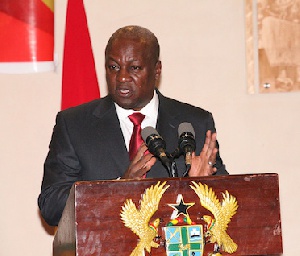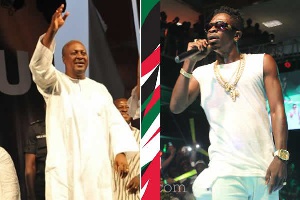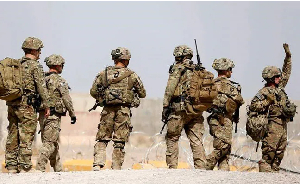- Home - News
- TWI News | TV
- Polls
- Year In Review
- News Archive
- Crime & Punishment
- Politics
- Regional
- Editorial
- Health
- Ghanaians Abroad
- Tabloid
- Africa
- Religion
- Election 2020
- Coronavirus
- News Videos | TV
- Photo Archives
- News Headlines
- Press Release
General News of Thursday, 23 October 2014
Source: GNA
Mahama clears air on Ebola, corruption
President John Mahama has assured Ghanaians living abroad that the use of the country as a logistics base to tackle the deadly Ebola outbreak in West Africa would not present a health risk to the country.
“We are not building treatment centres in Ghana. We are a staging post for equipment going to Ebola-hit countries,” he told journalists representing Ghanaian media organisations abroad at the Ghana High Commission in London.
President Mahama, who is in London for a series of investment conferences, added: “As President, I don’t want Ebola to spread to our country.”
The UN and other international organisations have been using Accra as their logistics and coordination centre to airlift supplies and personnel to the most affected countries – Liberia, Sierra Leone and Guinea – that have had international flights suspended.
Thus, Accra has been able to provide a lifeline to these Ebola-hit countries.
President Mahama used his press conference to reach out to the Ghanaian Diaspora, explaining that this was a better way to do it than hold town hall meetings with Ghanaians abroad.
The wide-ranging press conference covered issues including education, elections, the economy and corruption.
President Mahama said that $100 million from the World Bank was being invested in the country’s education system, as the government moved ahead with free secondary education.
He said that there were a lot of challenges such as the quality of and access to education, and as such the investment would remove these obstacles.
The President explained that the discrepancies in school fees – whereby extras were added – had been removed and now every school would charge universally agreed fees.
Touching on the issue of Ghanaians living abroad voting in presidential and parliamentary elections in the country, President Mahama said that although it was a good idea, the government had to be convinced that the Electoral Commission had the capacity to undertake such an exercise.
“As you can see, even in the last elections there were contentious issues for the Electoral Commission to deal with,” he noted.
Turning to the economy, President Mahama noted that the government’s approach to the International Monetary Fund (IMF) was not for a bail out but a “two-year partnership programme with the IMF” to restore financial stability to the country.
He said the good thing about the assistance was that the IMF now, unlike in the past, allowed subsidies that targeted productive sectors of the economy and communities.
He explained that Ghana was importing $270 million worth of sugar each year and spending $400 million annually on bringing in rice.
President Mahama said that the IMF financial assistance would go to these sectors in order to reduce Ghana’s import bills for these commodities.
“We are going to make strategic investments,” President Mahama said.
On the thorny issue of corruption, he said that if there was a perception that there was an apparent rise in corruption this was because there was more exposure of it because the government was putting systems in place to stem the tide.
For instance, he said, the government was introducing technology to reduce corruption in procurement.
“But some people don’t want this because with the manual system they can fiddle the invoices whereas with real time procurement the figures are fixed and can’t be fiddled with,” President Mahama said.
He said corruption had been rife because “the systems are weak; supervision is weak; and enforcement is weak”.
“So we are now introducing technology to curb corruption. We are putting things in place to remove the human side of corruption.
“This is one of the achievements of this government that has not been reported in the press,” the president said, adding that tackling corruption was a “multi-dimensional fight that should involve all of us”.
To those who call for more draconian action against corruption, President Mahama said the government could not just arrest people like in the revolutionary days in Ghana, only to find out that they were not guilty of corruption.
“In a democratic society we have to go through the legal process of fighting corruption,” President Mahama said.





![Construction has stalled on the National Cathedral [Image Credit: Nipah Dennis/Al Jazeera] Construction has stalled on the National Cathedral [Image Credit: Nipah Dennis/Al Jazeera]](https://cdn.ghanaweb.com/imagelib/pics/588/58802743.295.jpg)





